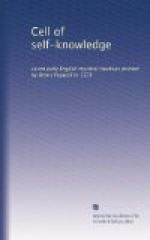clepe the spirit of malice, of wrath, and of wickedness
the worst spirit of them all; and why? Certes,
for it reaveth us the best thing of all, and that
is charity, the which is God. For who so lacketh
peace and restfulness of heart, him lacketh the lively
presence of the lovely sight of the high peace of heaven,
good gracious God His own dear self. This witnesseth
David in the psalm, where he saith, that the place
of God is made in peace, and His dwelling place in
Sion.[294] Sion is as much to say as the sight of
peace; the sight of the soul is the thought of that
same soul; and, certes, in that soul that most is
occupied in thoughts of peace hath God made His dwelling
place.[295] And thus saith Himself by the prophet,
when he saith: “Upon whom shall my spirit
rest, but upon the meek and the restful."[296] And,
therefore, who so will have God continually dwelling
in him, and live in love and in sight of the high
peace of the Godhead, the which is the highest and
the best party of contemplation that may be had in
this life, be he busy night and day to put down, when
they come, the spirit of the flesh and the spirit
of the world, but most busily the spirit of malice,
of wrath, and of wickedness, for he is the foulest
and the worst filth[297] of all. And it is full
needful and speedful to know his quaintise, and not
for to unknow his doleful deceits. For sometime
he will, that wicked cursed wight, change his likeness
in to an angel of light, that he may under colour
of virtue do more dere;[298] but yet then, if we look
more redely,[299] it is but seed of bitterness and
of discord that that he sheweth, seem it never so
holy nor never so fair at the first shewing. Full
many he stirreth unto singular holiness passing the
common statute and custom of their degree, as is fasting,
sharp wearing, and many other devout observances and
outward doings, in open reproving of other men’s
defaults, the which they have not of office for to
do. All such and many other he stirreth them
for to do, and all under colour of devotion and of
charity; not for he is delighted in any deed of devotion
and of charity, but for he loveth dissension and slander,
the which is evermore caused by such unseemly singularities;
for where so ever that any one or two are in any devout
congregation, the which any one or two useth any such
outward singularities, then in the sight of fools
all the remenant are slandered by them; but, in the
sight of the wise man, they slander themselves.
But for because that fools are more than wise men,
therefore for favour of fools such singular doers
ween that they be wise, when (if it were wisely determined)
they and all their fautors[300] should be seen apert
fools, and darts shot of the devil, to slay true simple
souls under colour of holiness and charity. And
thus many deceits can the fiend bring in on this manner.




